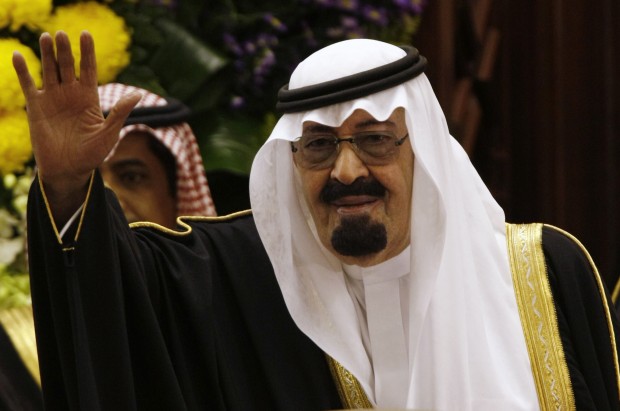
King Abdullah bin Abdul Aziz al-Saud of Saudi Arabia waves to members of the Saudi Shura Council in Riyadh, Saudi Arabia. King Abdullah granted women seats on the Shura Council, the country’s top advisory council, for the first time on Friday, Jan. 11, 2013 (AP Photo/Hassan Ammar, File)
Riyadh, Asharq Al-Awsat – Custodian of the Two Holy Mosques, King Abdullah Bin Abdulaziz, issued a historical decree on Friday allowing women to become members of the Kingdom’s previous all-male Shura Council for the first time. The King’s decree amended two articles of the Shura Council’s statute, introducing a 20 percent quota for women in the country’s 150-member advisory council.
In 2011, King Abdullah Bin Abdulaziz had announced that women would join the 150-member advisory body which functions like a parliament but did not specify how many would serve. The council has had 12 women advisers since 2006.
In two royal decrees issued on Friday, Custodian of the Two Holy Mosques, King Abdullah Bin Abdulaziz reconstituted the Shura Council for a new four-year term and ordered that women should always hold at least 20 percent of the seats.
Shura Council members informed Asharq Al-Awsat that the scale of Saudi women joining the advisory body, which exceeds female representation at other Arab or Gulf – and even some international – parliaments is proof of King Abdullah’s commitment to moving forward with reform and supporting women’s participation in all fields of public life in Saudi Arabia.
For her part, newly appointed Shura Council member Dr. Thhuraya Obaid told Asharq Al-Awsat that “the time has come for Saudi women to take part in decision-making.” Dr. Obaid is a veteran UN administrator who served as executive director of the UN Development Program and undersecretary general of the world body.
Shura Council Speaker Abdullah Al Al-Sheikh was also reappointed to serve another term. Speaking following King Abdullah’s announcement, he stressed that “all arrangements to accommodate the women members will be made” adding “the enrolment of women as members of the council will represent a qualitative shift in its functions.”
He welcomed Saudi women to the Shura Council asserting that “Saudi women have excelled in education, health-care, economics, administration and other fields.” Al-Sheikh also pledged that the Shura Council would follow the guidelines put forward by the Custodian of the Two Holy Mosques and work for national unity, development and regional peace and security.
The Saudi Press Agency [SPA] reported the following:
Two royal orders, amending the Shura Council system and forming a new chamber starting at the expiration of the term of office of the current Shura Council, have been issued here today:
According to the Royal Order, the Shura Council will consist of its Speaker and 150 members, all of whom will be chosen by the King according to their knowledge, experience and profession, provided that women will represent no less than 20 percent of the Council’s members.
The Royal Order read: After having reviewed the Governance Statute and the Shura Council’s system and regulations and consulted with a large number of Ulema and members and non-members of the Senior Ulema Commission, the proposal regarding the participation of women in the Shura Council was passed in accordance with Islamic Sharia laws. This is a course we are not going to divert a hair’s breadth from as it is considered the pillar base of this nation laid by its founder King Abdulaziz, and is in the best interests of the public. We have therefore ordered the amendment of the Third Article of the Shura Council system to read as follows:
First amendment – Article 3
The Shura Council constitutes 150 members, chosen by the king among scholars, experts and specialists, with women’s representation to be no less than 20 percent of the number of members. The rights of members and their obligations and all their affairs are defined by a royal decree.
Second amendment – Article 22
First, each committee of the specialized committees will be made up of a number of members defined by the council, but should not be less than five. The council chooses these members and names the head of the committee and his deputy taking into consideration the committees’ needs, the specialization of its members and the female Shura Council members’ participation in the committees.
Second, the Shura Council can form among its members special committees to study a particular subject, and each committee has the right to form among its members a branch committee or more to study a particular subject.
Third, women selected as Shura Council members will enjoy full membership rights, abide by their obligations and responsibilities and assume their tasks.
Fourth, in confirmation of what was stated in the preamble of this decree, the woman members commit to the principles of Islamic Sharia law without any breach whatsoever and wear hijab. In particular, the following should be taken into account:
1: Reserving a place for the women to sit, as well as their own gate for entry and exit in the main Council Chamber, and everything related to their affairs to ensure independence from men.
2: Reserving places for women, fully independent from places reserved for men, to include offices for them and for employees with required equipment and services, and space for prayer.
Fifth: This decree is to be delivered to the relevant parties for immediate adoption and implementation.

File photo of Custodian of the Two Holy Mosques, King Abdullah Bin Abdulaziz. (SPA)

File photo of Custodian of the Two Holy Mosques, King Abdullah Bin Abdulaziz gesturing during a cabinet session at his palace in Riyadh. (SPA)
